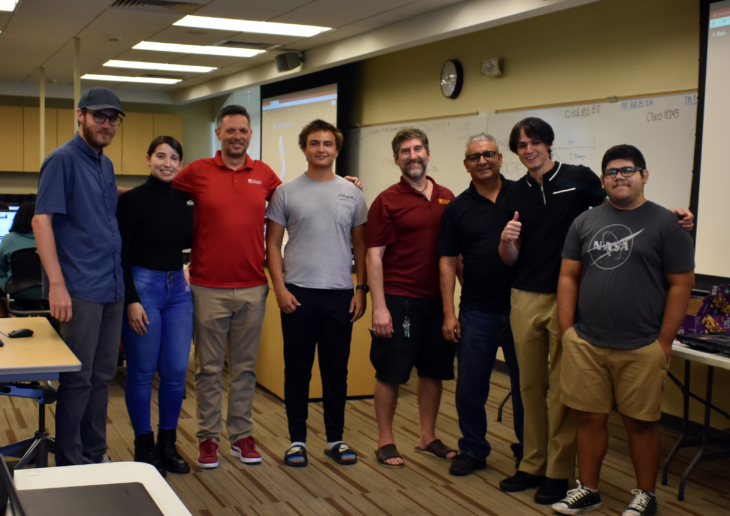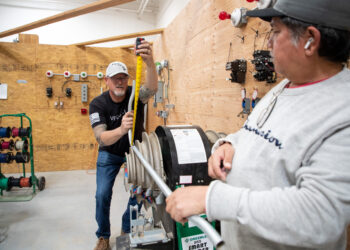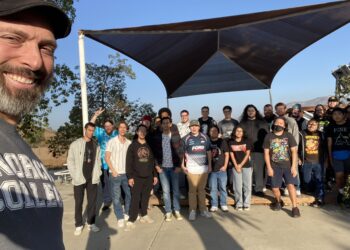Celebrating CTE: Exploring Inland Empire/Desert CTE Program Achievements

For Inland Empire/Desert community colleges, career and technical education (CTE) programs are the foundation for students’ career success. These CTE programs provide the valuable skills for grads to soar in nearly any industry: From automotive to aviation, cybersecurity to healthcare, manufacturing to education, and beyond.
This February, we’re recognizing National CTE Month, which highlights vital CTE programs across the country and how they lead students to successful and high-powered careers. To celebrate, we’re rounding up some Inland Empire/Desert CTE success stories from the past year and showcasing how these vital programs are supporting regional students.
Success in these CTE programs start with first-rate facilities. Last January, Barstow Community College opened its doors to its state-of-the-art Career and Technical Education Complex. The new space provides students with fully equipped workshops for Automotive Technology and Diesel Technology programs, upgraded labs for Electrical and Industrial Maintenance programs, and spacious classrooms, a conference room, and administration offices.
“The big thing is giving students a space where they can actually do the lab work that’s required for these programs,” says Mark Weller, BCC Automotive instructor.
Plus, the facility brings more opportunities for students to experience hands-on training in these trades. Dr. Crystal Nasio, Executive Dean of Strategic Partnerships & Workforce Development, notes, “There is a lot of economic development in the works here at Barstow.”
One development includes the $1.5 billion Barstow International Gateway project from the BNSF Railway. The development of the state-of-the-art railway facility is expected to generate about 20,000 direct and indirect jobs.
“We have been in partnership with [BNSF] for years providing welding training to their incumbent workers,” Dr. Nasio explains. “We know that the economic boom coming to Barstow is an opportunity for BCC to rapidly respond through short-term training that can provide the foundation for a lifetime career.”
While BCC prepares students for a career to last a lifetime, Crafton Hills College Respiratory Care program is helping students prepare to save lives. CHC was the first Inland Empire/Desert community college to launch a bachelor’s degree program in Respiratory Care. The program is the
fourth of its kind in the state and the third at the community college level. The groundbreaking program’s inaugural cohort began its semester in past January.
“This [program] will allow advanced degrees at a reasonable cost to students throughout California and help with the continuing mission at Crafton Hills College, which is to prepare students for success in the future,” explains Michael Sheahan, faculty co-chair and director of the Respiratory Care program.
Victor Valley College is following Crafton Hills College’s lead with its Respiratory Therapy program, that, according to VVC Program Director Dr. Traci Marin, has its own plans of eventually offering a pathway to a bachelor’s degree.
“VVC has the largest pool of clinical sites available for respiratory therapy students in Southern California,” Dr. Marin explains. “Students obtain experience in the clinical setting working alongside a respiratory care practitioner while being guided by experienced clinical instructors.”
This hands-on experience is what sets this program — and many Inland Empire/Desert CTE programs — apart from others. Through clinical experience and internship opportunities, students gain the essential skills they can’t learn from reading a textbook. Just ask Computer Information Systems (CIS) students at College of the Desert, where experience is essential to landing a job after graduation. Finding this experience on your own can be challenging, which is why College of the Desert’s CIS program partners with Rancho Mirage-based Eisenhower Medical Center and COD’s own cyber organization, CISGeeks. The partnership with Eisenhower Medical Center helps place students into dynamic CIS positions available at the facility.
“That is always the hard part,” admits CIS program spearhead and professor Felix Marhuenda-Donate about students gaining the on-the-job training. “That’s why we work so hard on CISGeeks … Just so that [students] can start getting in the field.”
CISGeeks presents students with an opportunity to travel off campus and put their skills to the test by providing technical support out in the community. “We’re pretty much the same thing as the Geek Squad, but it’s all free services,” Marhuenda-Donate continues.
“It is the experience in working with many different people and in problem-solving all types of computer-related issues that is the true payoff,” adds COD Laboratory Specialist Mark Rizzo. Once students earn their experience and complete the program, a job is essentially guaranteed, unless they plan on moving forward into a four-year degree program.
“Several of our successful prior students have gone through our program and have taken their knowledge to the next level,” shares Rizzo.
Speaking of soaring, students in the Chaffey College Aviation Maintenance Technology (AMT) program are preparing themselves to take off into the high demand career of aviation maintenance. AMT professor Jack Little says students in the program can expect to earn annual salaries of $70,000 to $80,000 upon completing the program.
“And that’s just base pay,” Little describes. “We cannot put people out the door fast enough to meet the demand of the industry.”
With 270-plus available jobs across the region, the AMT program aligns students with the experience and skills they need to land a position in the industry. After completing the program, students earn their Airframe and Powerplant Certificate, allowing them to perform maintenance on virtually any aircraft.
Plus, three of the program’s instructors are all former students themselves. Instructor Donnie Guess says the foundation he built at Chaffey gave him the chance to have a 20-plus-year career and the once-in-a-lifetime opportunity to return and teach what he’s learned. “I graduated from the AMT program at Chaffey College in 2001 and am very thankful that I can give back to the program that has given me so much.”
Jack Little is also an alum of the AMT program and is proud to share his knowledge of the industry with the next wave of the workforce. “We want to see them succeed,” Little proudly says about his students.
“We give the student the tools to go out and be successful.”
And that sentiment could be said about every CTE program at the Inland Empire/Desert region’s 12 community colleges. By offering the space and support for students to thrive, CTE career success is certain to come soon after.



